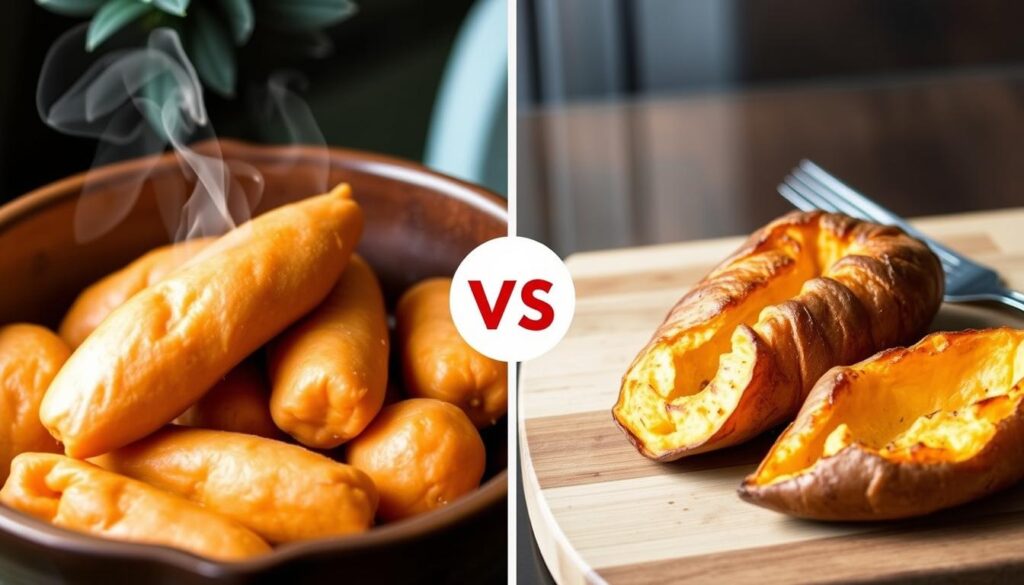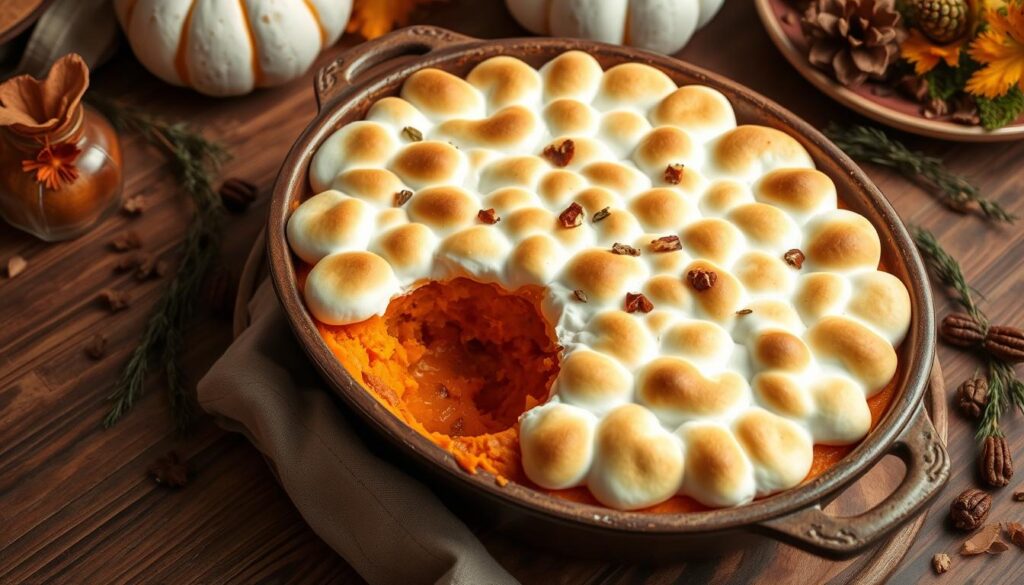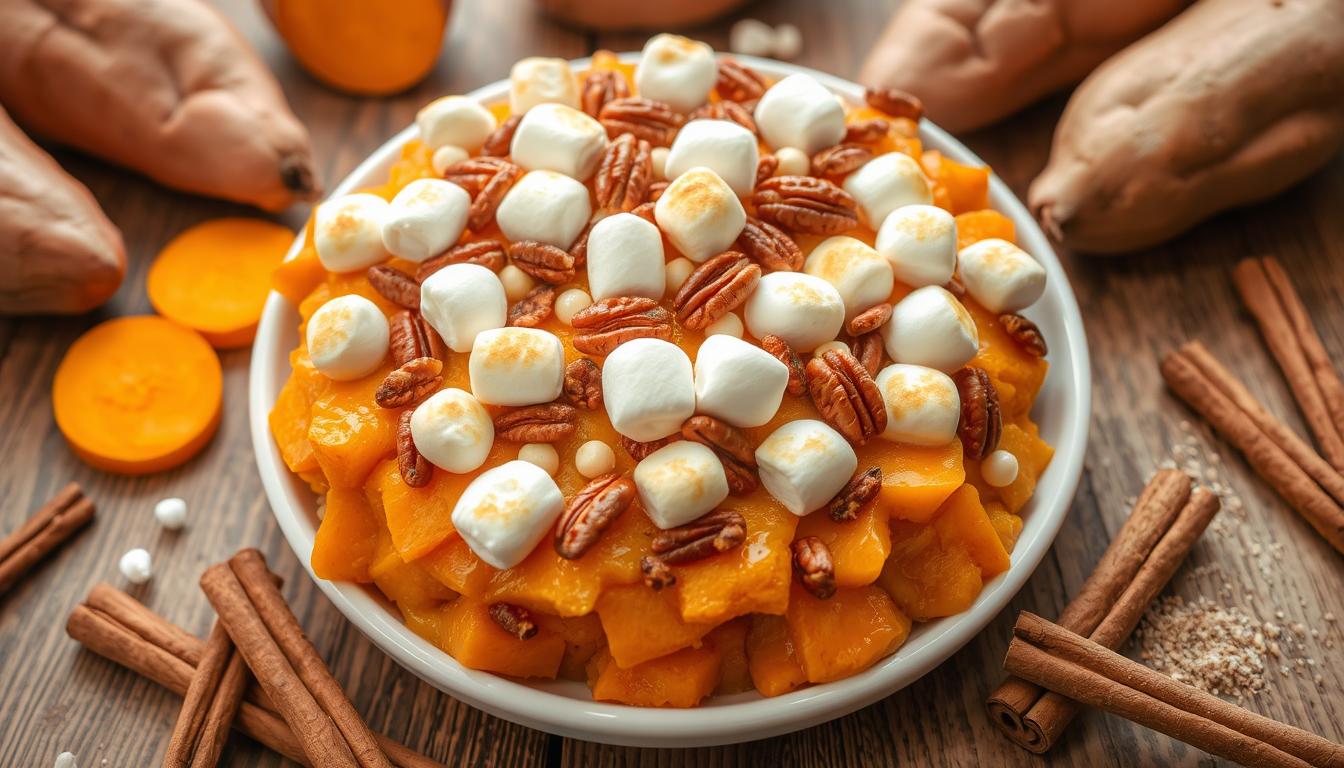As autumn’s cool breeze blows, the smell of sweet potato casserole fills the air. This tuber is a favorite in many American homes, used in many dishes. But, the question remains: should you boil or bake sweet potatoes for the best casserole?
Key Takeaways
- Boiling and baking sweet potatoes offer distinct advantages and disadvantages for a casserole.
- Texture, flavor, and nutritional considerations play a crucial role in determining the optimal cooking method.
- Preparation and time factors can also influence the decision between boiling or baking sweet potatoes.
- Versatility in sweet potato casserole recipes allows for personal preferences and creativity.
- Understanding the nuances of each cooking technique can help you create the perfect sweet potato casserole.
Understanding the Difference Between Boiling and Baking Sweet Potatoes
Choosing how to cook sweet potatoes for a casserole is key. Boiling and baking are two popular methods. Each has its own benefits and drawbacks, affecting the dish’s texture and taste.
Boiling Sweet Potatoes: Pros and Cons
Boiling sweet potatoes is fast and simple. It makes them soft, perfect for mashing or pureeing. This method also keeps more of their natural sweetness and moisture.
However, boiling can make sweet potatoes too soft and watery. This might not be what you want for a casserole that needs a firmer texture.
Baking Sweet Potatoes: Advantages and Drawbacks
Baking sweet potatoes takes longer but is worth it. The oven’s dry heat enhances their sweetness. Baked sweet potatoes are drier and fluffier, great for casseroles.
The downside is baking’s longer cooking time and the need to pierce the potatoes to let steam out.
Whether to boil or bake sweet potatoes for a casserole depends on your taste and recipe. Knowing the differences between boiling and baking can help you choose. This way, you can make a sweet potato casserole that you’ll love.

Is it better to boil or bake sweet potatoes for a casserole?
Choosing between boiling or baking sweet potatoes for a casserole is a big decision. Each method has its own advantages and disadvantages. The right choice depends on what you like best and what you want your casserole to be like.
Texture is a big factor. Boiling sweet potatoes makes them soft and uniform, great for a creamy filling. Baking them gives a denser, drier texture, perfect for a chunkier casserole.
Flavor is also key. Baking sweet potatoes brings out their natural sweetness and caramelized flavors. Boiling them might make the flavor milder and less intense.
In the end, your choice of cooking method depends on your taste and what you want your casserole to be like. Try both methods to see which one you like best.

“The key to a perfect sweet potato casserole is finding the right balance between texture and flavor, and that starts with choosing the [which is better for sweet potato casserole, boiled or baked sweet potatoes] cooking method that works best for you.”
Preparing Sweet Potatoes for a Casserole
Starting a sweet potato casserole is all about preparing the sweet potatoes right. You can boil or bake them, and each method affects the dish’s texture and taste. Let’s explore how to get your sweet potatoes ready for a casserole.
Essential Ingredients and Equipment
To make a sweet potato casserole, you need some key ingredients and tools. First, grab several sweet potatoes, available all year in most stores. You’ll also need butter, sugar, spices, and any extra you like.
For equipment, a sharp knife, cutting board, and a big pot or baking sheet are must-haves. You might also need a mixer or blender, depending on your recipe.
- Sweet potatoes
- Butter, sugar, and spices
- Knife, cutting board, and pot or baking sheet
- Mixer or blender (optional)
With the right ingredients and tools, you’re set to make a tasty sweet potato casserole. It’s sure to impress your family and friends.
Textural Considerations: Boiled vs. Baked Sweet Potatoes
The texture of your sweet potato casserole is very important. Whether you boil or bake the sweet potatoes makes a big difference. Knowing how each method affects the texture helps you get the perfect creamy or chunky dish.
Boiling sweet potatoes makes them soft and delicate. The boiling water breaks down the starches, making them smooth like mashed potatoes. But, boiling can also make the casserole watery, so you might need to thicken it.
Baking sweet potatoes gives them a firmer texture. The oven’s dry heat caramelizes the sweet potatoes, making them denser and more flavorful. This is great if you like a chunkier casserole.
| Texture of Boiled Sweet Potatoes | Texture of Baked Sweet Potatoes |
|---|---|
| Soft, delicate, and velvety | Firm, dense, and slightly chunky |
| Ideal for a silky smooth casserole | Suitable for a heartier, more substantial casserole |
Choosing between boiling or baking sweet potatoes depends on what you like. Thinking about the texture of boiled vs baked sweet potatoes helps you pick the right method. This way, you can make a sweet potato casserole that’s just right for you.
Flavor Profiles: The Impact of Cooking Methods
The way you cook your sweet potatoes can change their taste in a casserole. Boiling and baking are the most common methods. Each method brings out different flavors in sweet potatoes.
Enhancing Flavors through Boiling and Baking
Boiling sweet potatoes makes them taste more delicate. The natural sugars stay, making them sweet and creamy. Baking, however, caramelizes the sugars. This makes the sweet potatoes sweeter and adds earthy, nutty flavors.
When making a sweet potato casserole, think about how cooking affects taste. Baked sweet potatoes are great for a sweeter flavor. Boiled sweet potatoes are better for a lighter, more versatile base.
| Boiled Sweet Potatoes | Baked Sweet Potatoes |
|---|---|
| Preserves natural sweetness | Caramelizes sugars for an intense sweetness |
| Produces a creamy, delicate texture | Develops an earthy, nutty flavor profile |
| Versatile base for casserole flavors | Complements bold, sweet casserole flavors |
Whether you boil or bake your sweet potatoes, seasoning is key. Flavor of boiled vs baked sweet potatoes can be improved with spices and herbs. These add to the sweet potato casserole flavors and enhance the seasoning sweet potatoes for casserole.
Nutritional Benefits: Boiled or Baked Sweet Potatoes?
The way you cook sweet potatoes affects their nutritional value. Whether you boil or bake them impacts the vitamins, minerals, and antioxidants they keep.
Boiling sweet potatoes might keep more of their antioxidants. This means more vitamin A for you. It also has a lower glycemic index than baking, which is good for blood sugar control.
Baking sweet potatoes, however, can lead to a loss of vitamin A. But it makes the flavors richer and the sugars caramelized. This can make your sweet potato casserole taste even better.
| Nutrient | Boiled Sweet Potatoes | Baked Sweet Potatoes |
|---|---|---|
| Vitamin A | Higher retention | Significant loss |
| Antioxidants | Better preservation | Some degradation |
| Glycemic Index | Lower | Higher |
Both boiling and baking have their benefits for sweet potatoes. Your choice depends on what you prefer and your dietary needs. This is especially true when making a tasty and health benefits of sweet potato casserole.
“Boiling sweet potatoes may be the healthier option, as it helps retain more of the vegetable’s beneficial nutrients and antioxidants.”
Thinking about the sweet potato casserole nutrition helps you choose the best cooking method. This way, your dish will be both delicious and nutritious.
Time and Convenience Factors
Preparing a sweet potato casserole involves considering time and convenience. The choice between boiling or baking sweet potatoes affects the prep time.
Boiling sweet potatoes is quicker, taking 15-20 minutes. Baking can take up to an hour or more, depending on the potato size and oven temperature.
Boiling is more convenient because it’s quicker and hands-off. Just drop the peeled and cubed potatoes into boiling water. Baking requires more effort, like preheating the oven and monitoring the potatoes.
| Boiling Sweet Potatoes | Baking Sweet Potatoes |
|---|---|
| Quicker cooking time (15-20 minutes) | Longer cooking time (up to 1 hour) |
| Hands-off cooking process | More active preparation required |
| Convenient for time-pressed schedules | Allows for more caramelization and flavor development |
Choosing between boiling or baking sweet potatoes depends on your time and preference. Boiling is quicker and easier for busy schedules. Baking offers a richer flavor and caramelized taste, but takes longer.
Versatility in Sweet Potato Casserole Recipes
Choosing between boiling or baking sweet potatoes in casseroles opens up many possibilities. You can make everything from classic baked casseroles to savory boiled ones. This dish is incredibly versatile.
For a smooth, creamy casserole, boiling is a good choice. Boiling makes sweet potatoes soft and easy to mash. You can mix them with milk, butter, and spices for a rich texture.
Baking sweet potatoes, on the other hand, brings out a deeper flavor. The natural sugars caramelize, giving a sweet and nutty taste. Baked casseroles are tender but firm, perfect with toppings like pecans or marshmallows.
| Boiled Sweet Potato Casserole | Baked Sweet Potato Casserole |
|---|---|
| – Smooth, creamy texture – Rich, velvety consistency – Ideal for savory or lightly sweetened dishes |
– Deeper, more concentrated flavor – Slightly firm, tender texture – Great for sweet, indulgent recipes |
Boiling or baking sweet potatoes can lead to amazing casseroles. You can try classic recipes or get creative with sweet potato gratin or soufflé. The options are endless.
“The beauty of sweet potato casserole is that it can be tailored to suit any taste preference or dietary need.”
Whether you want a creamy boiled casserole or a rich baked one, you can make it. Try different cooking methods and ingredients to find your favorite sweet potato casserole.
Conclusion
Exploring boiling and baking sweet potatoes for casserole shows both methods have good points. Your choice depends on what you like best and what you want your casserole to be like.
Boiling sweet potatoes is quicker and makes them softer. This is great if you’re short on time. But baking gives a sweeter flavor and a firmer texture, which some people love.
So, whether you boil or bake, you can make a tasty sweet potato casserole. The important thing is to try different ways and see what works best for you. This way, you’ll make a casserole that looks good and tastes amazing.
